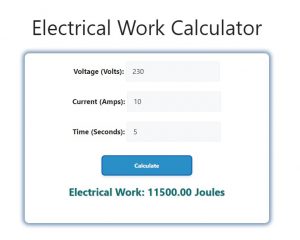About Electrical Work Calculator (Formula)
The electrical work calculator is an essential tool for anyone dealing with electrical systems, whether for residential, commercial, or industrial purposes. This calculator helps you determine the amount of electrical work done over a specific period based on voltage, current, and time. By understanding how electrical work is calculated, you can make informed decisions regarding energy usage, cost estimates, and system efficiency, ultimately leading to more effective energy management.
Formula
The formula for calculating electrical work is:
We = V * I * t
Where:
- We represents the electrical work done, measured in joules (J).
- V stands for voltage, measured in volts (V).
- I refers to current, measured in amperes (A).
- t is the time in seconds (s) during which the current flows.
How to Use
To use the electrical work calculator, follow these steps:
- Gather Required Data: You will need the values for voltage (V), current (I), and the time (t) for which the current flows.
- Input Values: Enter the voltage, current, and time into the calculator.
- Calculate Electrical Work: The calculator will apply the formula and provide you with the total electrical work done.
- Analyze Results: Review the calculated value to understand the energy consumed in your electrical system.
Example
Imagine you have the following parameters for an electrical device:
- Voltage (V) = 230 V
- Current (I) = 10 A
- Time (t) = 5 seconds
Using the formula:
We = 230 * 10 * 5 = 11500 joules
This means the electrical work done by the device over the specified time is 11,500 joules.

FAQs
- What is electrical work?
Electrical work refers to the energy consumed or performed by electrical systems and is measured in joules. - Why is it important to calculate electrical work?
Calculating electrical work helps in understanding energy consumption, cost estimation, and improving efficiency. - What units are used for electrical work?
Electrical work is typically measured in joules (J) or kilowatt-hours (kWh) for larger quantities. - What do voltage and current represent?
Voltage is the electrical potential difference, while current is the flow of electric charge in a circuit. - How can I convert joules to kilowatt-hours?
To convert joules to kilowatt-hours, divide the number of joules by 3.6 million (1 kWh = 3.6 million joules). - What tools can I use to measure voltage and current?
You can use a multimeter or clamp meter to measure voltage and current in electrical circuits. - What factors can affect electrical work calculations?
Factors include changes in voltage, current fluctuations, and the duration of the current flow. - Is the electrical work calculator accurate?
Yes, if the input values are correct, the calculator provides accurate results based on the formula. - How does time affect electrical work?
Increasing the time for which current flows will increase the total electrical work done. - What are some common applications for electrical work calculations?
Applications include calculating energy costs, determining the efficiency of electrical systems, and assessing power consumption in appliances. - Can I use this calculator for AC circuits?
Yes, but make sure to consider root mean square (RMS) values for voltage and current in AC circuits. - What is the relationship between electrical work and power?
Electrical work is related to power (measured in watts) by the formula: Power = Work / Time. - How can I reduce electrical work in my home?
To reduce electrical work, use energy-efficient appliances, install programmable timers, and improve insulation. - What should I do if the calculated work seems unusually high or low?
Double-check your input values and ensure that the measurements are accurate. - Are there other ways to calculate energy consumption?
Yes, you can also calculate energy consumption based on wattage and usage time. - What is the significance of measuring electrical work?
Measuring electrical work is essential for energy management, budgeting, and system design. - Can I calculate electrical work for renewable energy systems?
Yes, the electrical work calculator can be used for solar, wind, and other renewable energy systems. - How does electrical work impact my utility bill?
Higher electrical work translates to higher energy consumption, which directly affects your utility bill. - Is it necessary to have a degree in electrical engineering to use this calculator?
No, anyone can use the calculator as long as they understand the basic concepts of electricity. - What safety precautions should I take when measuring voltage and current?
Always ensure you are using the correct settings on your measuring device, wear appropriate protective gear, and avoid working on live circuits if possible.
Conclusion
The electrical work calculator is a powerful tool that provides valuable insights into the energy consumption of electrical systems. By understanding and calculating electrical work, you can optimize your energy use, reduce costs, and improve the efficiency of your electrical devices. Regularly assessing electrical work is crucial for maintaining safe and effective operations in any electrical system. Whether for home projects or industrial applications, leveraging this calculator can lead to smarter energy management and enhanced performance.